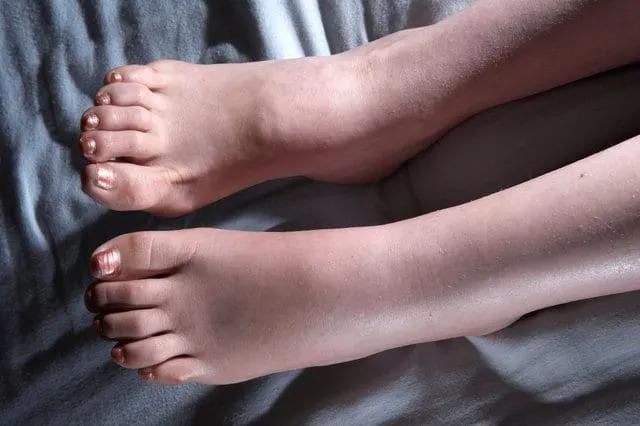
When To Be Concerned About Leg Swelling

If it’s hot, or you’ve been on your feet all day, it isn’t uncommon for you to experience some type of leg or ankle swelling. Other causes like hormonal fluctuations, dietary changes and even certain types of medication can also trigger the limbs to swell. However, in many cases, the main cause – particularly in the legs and feet – is vein problems or vein disease.
Edema (the technical name for swollen limbs) if left untreated, can turn into something more serious such as lymphedema or progressive skin deterioration which can easily ulcerate.
Thankfully, here at the Midwest Institute for Non-Surgical Therapy (MINT) Dr. Akinwande and his team are highly skilled and highly experienced at preventing, diagnosing, and treating a wide variety of vein problems. All our cutting-edge treatments are carried out with total compassion and care, so patients are rest assured of being in safe and highly capable hands
If you do experience any form of regular or uncomfortable leg swelling, then it’s vital that you see an experienced clinician at the earliest opportunity.
How can we help?
When you visit us for a first appointment, Dr. Akinwande will check out your medical history and examine your legs for signs of edema. If your legs appear puffy and the skin shiny, then you could have edema. One of the tell-tale signs is a persistent indentation around the ankle bone towards the end of the day.
The good news is that not all edemas are classed as serious, nor do they require emergency care. Edema may simply be down to hormone fluctuations like in the case of a pregnant woman. It could even be down to a sprain or injury. However, if any swelling lasts longer than 24 hours or it occurs frequently, it’s a good idea to let a qualified health provider take a closer look as it could be a sign of something more serious like heart, liver, and kidney disease.
So why do people suffer from leg swelling?
Typically, when swelling occurs in both legs then chances are that it’s nothing more than fluid retention, although you may want to speak to your doctor just to make sure. If the problem does turn out to be water retention then by…
- keeping your feet elevated for periods of time
- following a low salt diet and
- wearing compression socks or stockings…
… you’re more likely to alleviate the problem quicker
But what if one leg swells and becomes achy? What if the tissues under your leg start to become puffy, the skin appears visibly stretched and shiny, or the skin on your leg starts to retain pits that resemble dimples?
If any of these symptoms appear then you could be suffering from chronic vein insufficiency (CVI) or deep vein thrombosis (DVT)
If you do suffer from DVT, for example, a blood clot will often form in the vein inside the leg. The clot will disrupt any normal blood flow and cause the leg to swell. Blood clots can be dangerous because there is always an inherent risk of them breaking off and traveling via the blood stream to your lungs. When this happens, then the situation can become life- threatening very quickly.
Alternatively, with chronic vein insufficiency, the veins in your leg aren’t functioning correctly (particularly the valves) and this forces pools of unpumped blood to remain in your leg area. These pools of blood collect in the veins which become pronounced. Although chronic vein insufficiency can occur without the presence of pronounced (varicose) veins, it can be a good indicator that you might have a CVI problem. Ultimately, both chronic venous insufficiency and varicose veins can also result is swollen legs.
Why should you take this seriously?
Just like DVT, chronic vein disease – and to a certain extent – varicose veins can be problematic if not treated. These conditions can lead to serious health problems such as leg ulcers, severe discomfort, and further blood clotting. For this reason, it’s always best to speak with your local doctor who should refer you to a vein specialist.
The good news is that all these conditions are treatable, many of which are carried out using non-surgical methods. Your specialist may give you a gentle exercise program to alleviate any leg swelling and pain and offer up a number of treatments designed to treat your vein condition.
If you have swollen, painful legs or problematic veins, then contact Dr. Akinwande at the Midwest Institute for Non-Surgical Therapy. He will perform a complete evaluation to determine the cause of your problem and will also put together a comprehensive treatment plan for dealing with it.
You shouldn’t have to suffer from leg or vein problems. Instead, start the ball rolling and call the team at MINT today at one of our 5 clinics, including the latest addition in Chicago, IL.
You Might Also Enjoy...


Thinking About the Prostatic Artery Embolization Procedure? Here's How Eligibility Is Determined

The Truth About PAE Side Effects: A Patient’s Guide

Say Goodbye to BPH Symptoms: How PAE is Revolutionizing Prostate Care

Is Stress Affecting Your Prostate? Understanding the Link & How to Protect Your Health


